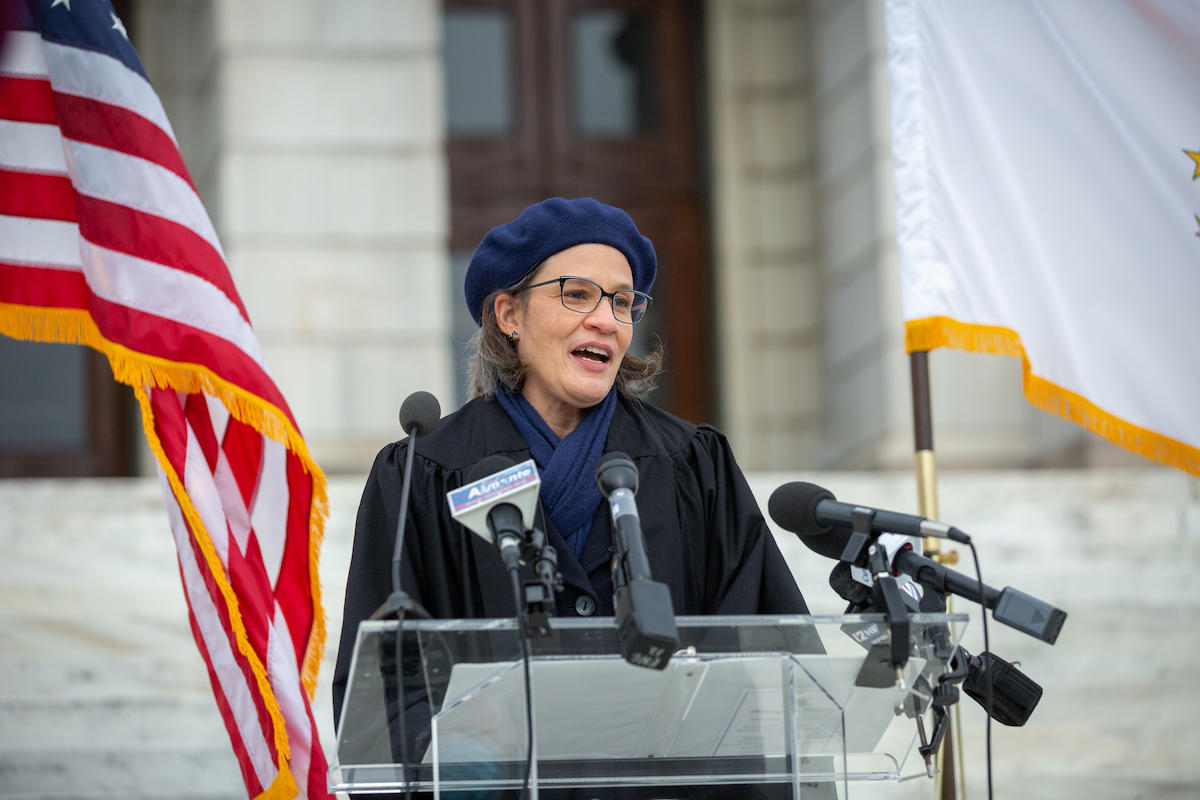Earlier this year, Melissa A. Long, a 1995 graduate of George Mason University’s Antonin Scalia Law School, was sworn in as the first Black justice on the Rhode Island Supreme Court. In addition, her ascension to the Rhode Island Supreme Court shifted women into the majority on the state’s high court.
Long was nominated to be an associate justice by former Rhode Island Gov. Gina Raimondo and confirmed by the state’s General Assembly in December. In an interview in February, Long said she recognizes the historical importance of being the first Black justice on the Rhode Island Supreme Court: “I don’t suggest that I can speak for all Black people, but I have a perspective and an experience that has not been represented on this bench.”
In addition, Long said that it is especially important right now for judges to remember that “we are at a low point in how people view our institutions, including the judiciary.
“It’s critically important for people to see that our institutions are working and that we are making decisions based on the rule of law,” said Long. She also said that when she is on the bench she tries to “remember that behind every case there are real people with real stories to share. Every single person coming before me has a story to tell that is important to them, and that also potentially has implications for generations of people.”
Long’s story is one of perseverance, going back generations.
“I like to say that my story is really an American story and a story of the American dream,” said Long.
Long’s father, who is Black, grew up in Blackstone, Virginia, which she said was “a segregated town with segregated schools.” He eventually moved to Washington, D.C. Her mother, who was white, grew up the youngest of nine in a poor family in Pennsylvania. Her parents met when her father, who joined the U.S. Army, and her mother, who joined the Women’s Auxiliary Army Corps, were stationed in San Antonio, Texas. They were married in Washington, D.C., one year before the landmark Supreme Court decision in Loving v. Virginia ending race-based restrictions on marriage.
Her father became an Army dentist, and her mother was a registered nurse. Growing up, Long and her siblings moved around a lot, living in Germany, Texas and South Korea before landing in Northern Virginia. Long attended the University of Virginia, where she majored in foreign affairs and minored in German.
Long, who lived with her parents while going to law school at Mason, credits Scalia Law for helping her grow into a lawyer. She said that Mason is a “great bargain” because it provides a “really good education and access to internship opportunities because of its location near Washington, D.C., but you don’t have to come out with the debt you can accumulate at other law schools.”
It’s also where she met James Edward “Ted” Long, her husband, with whom she now has three children.
During her time at law school, Long worked as a research assistant for Maxwell Stearns, a former Mason law professor.
“I am thrilled that Justice Long has been elevated to the Rhode Island Supreme Court,” said Stearns, now Venable, Baetjer & Howard Professor of Law at University of Maryland Carey School of Law. “While she worked as my research assistant, I watched a young woman become a skilled lawyer, a gifted writer, and a dedicated advocate. Ms. Austin, as she was then known, exuded a wisdom beyond her years, one deeply connected with her family’s remarkable history, which made her realize the serious racial injustices, among others, that confront members of our society through no fault of their own.”
After law school, she clerked for retired Fairfax County Judge Marcus D. Williams, and then worked for Fairfax County on child abuse and neglect cases before moving with her husband to Rhode Island.
Long worked in the appellate division of the Rhode Island Public Defender’s Office, the Rhode Island Department of Transportation, and then as Rhode Island Deputy Secretary of State before landing her seat on the Rhode Island Superior Court in 2017.
Long, who spends time mentoring the younger generation, has advice for Mason students, particularly the law students: “Don’t let a disappointing grade define you, and don’t compare yourself to other people.”
“The only person you should be competing with is yourself,” said Long. “Believe in yourself.”

